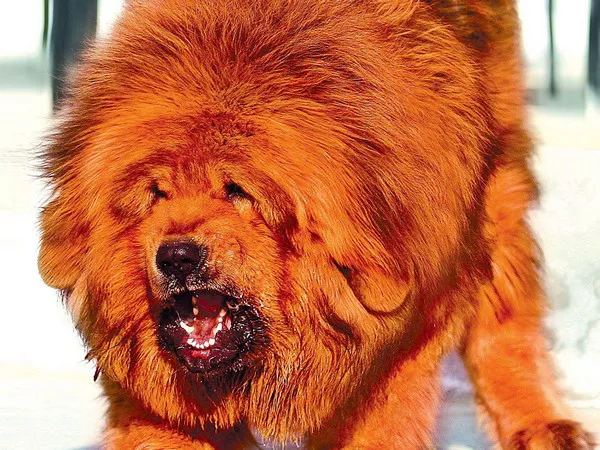Tibetan Mastiffs, with their majestic presence and loyal nature, are a cherished breed. To ensure the well-being of these magnificent dogs, it’s crucial for owners to be well-versed in Tibetan Mastiff health and care. In this comprehensive guide, we delve into common health issues, preventive care measures, and essential tips to keep your Tibetan Mastiff happy and healthy throughout their life. From eye problems to joint issues, we cover it all to empower owners with the knowledge needed for responsible and attentive care.
Eye Problems
Tibetan Mastiffs are prone to various eye problems that require careful attention. Chronic eye discharge is a common concern, often indicating underlying issues such as eye infections or chronic dry eye. Owners should regularly inspect their Tibetan Mastiff’s eyes for any signs of discharge, redness, or discomfort. Immediate veterinary attention is crucial to address issues promptly and prevent complications. Vision problems and the development of corneal ulcers are also potential concerns, underscoring the importance of regular eye check-ups to maintain optimal ocular health.
Elbow and Hip Dysplasia
Elbow and hip dysplasia are orthopedic conditions that can affect Tibetan Mastiffs, impacting their mobility and overall quality of life. These conditions involve malformations of the elbow or hip joints, leading to discomfort and reduced joint function. Regular veterinary check-ups, a balanced diet, and controlled exercise can contribute to joint health. In severe cases, surgical intervention may be necessary. Early detection and proactive management are key to ensuring a comfortable and active life for your Tibetan Mastiff.
Hypothyroidism
Hypothyroidism is a hormonal disorder that can affect Tibetan Mastiffs, leading to various symptoms such as lethargy, lack of appetite, weight gain, and hair and/or skin problems. Regular monitoring of your dog‘s behavior and physical condition is crucial to detect early signs of hypothyroidism. A thorough veterinary examination, including blood tests to assess thyroid function, is essential for an accurate diagnosis. Medication and dietary management are typically used to address hypothyroidism and help your Tibetan Mastiff lead a healthy and energetic life.
Mental Dullness
Mental dullness, characterized by a lack of interest or engagement, can be an indication of cognitive decline in Tibetan Mastiffs, especially as they age. Providing mental stimulation through interactive toys, puzzle games, and regular training sessions is essential to keep their minds active. Regular veterinary check-ups can also help identify any cognitive issues early on. A well-balanced diet, rich in antioxidants and omega-3 fatty acids, can further support cognitive health and overall well-being.
Preventive Care
Preventive care plays a pivotal role in maintaining the health and longevity of Tibetan Mastiffs. This includes regular veterinary check-ups, vaccinations, and dental care. Dental issues, if left unaddressed, can lead to various health problems. Establishing a consistent dental hygiene routine, such as regular brushing and providing dental treats or toys, contributes to oral health. Additionally, maintaining an appropriate weight through a balanced diet and regular exercise is vital for preventing various health issues, including joint problems.
Diet and Nutrition
Tibetan Mastiffs have specific nutritional needs that evolve throughout their life stages. A well-balanced diet, tailored to their age, size, and activity level, is crucial for overall health. High-quality dog food that includes essential nutrients such as protein, vitamins, and minerals is essential. Additionally, owners should be mindful of their Tibetan Mastiff’s weight to prevent obesity-related issues. Consultation with a veterinarian can help create a customized diet plan that addresses individual health requirements.
Regular Exercise
Balanced and moderate exercise is key to keeping Tibetan Mastiffs healthy and happy. These dogs are not overly active, but they benefit from daily walks, playtime, and mental stimulation. Exercise helps maintain a healthy weight, promotes joint health, and prevents behavioral issues associated with boredom. However, it’s crucial to avoid excessive or strenuous exercise, especially during the puppy growth phase, to prevent joint problems. Tailor the exercise routine to your Tibetan Mastiff’s age, health status, and individual preferences.
Grooming
The Tibetan Mastiff’s luxurious coat requires regular grooming to keep it healthy and free of mats. Brushing their coat a few times a week helps remove loose fur, prevents tangling, and distributes natural oils. Pay special attention to the undercoat, especially during shedding seasons. Bathing should be done as needed, using a dog-friendly shampoo. Regular inspections of ears, eyes, and paws are also part of the grooming routine. Maintaining proper grooming practices not only keeps your Tibetan Mastiff looking majestic but also contributes to their overall well-being.
Socialization and Training
Socialization and training are integral parts of Tibetan Mastiff care. Early socialization helps them become well-adjusted and confident adults. Expose your Tibetan Mastiff to various people, environments, and situations from a young age. Positive reinforcement training methods work well with these intelligent dogs, fostering a strong bond between owner and pet. Consistent and gentle training builds a well-behaved companion, making it easier to manage their powerful instincts and independent nature.
Conclusion
In conclusion, providing comprehensive care for your Tibetan Mastiff involves a combination of preventive measures, regular veterinary check-ups, and attentive grooming and training practices. Understanding the potential health issues, such as eye problems, joint dysplasia, hypothyroidism, and cognitive decline, allows owners to take proactive steps to ensure a long and healthy life for their majestic companions. With proper care, a balanced diet, and a nurturing environment, Tibetan Mastiffs can thrive as loyal and loving members of your family.


